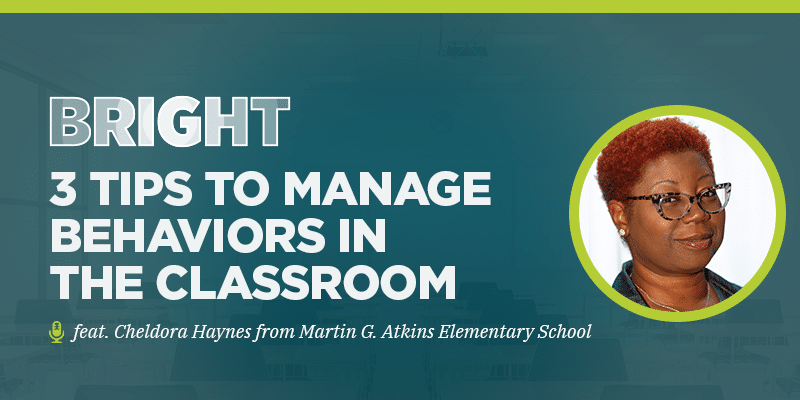Or listen on Apple, Spotify, or another platform. Alternatively, you can read along with the transcript.
After Cheldora Hayne’s first year of teaching, she embarked on a quest to improve her classroom management.
“There has to be there has to be better out there,’” she told herself during this pivotal moment. “People’s classrooms can’t look like this all the time.”
Her quest began many years ago, and clearly, it paid off. Just this year, Cheldora was honored as a 2021-22 regional teacher of the year for her work with third-graders at Martin G. Atkins Elementary School in Bridgeport, MI.
In this episode of the BRIGHT podcast, Cheldora and I talk about:
- Her quest toward better classroom management,
- Her philosophy on student agency and accountability, and
- Her top three tips for managing behaviors in the classroom.
Here’s a sneak peek at our conversation:
You can listen to my conversation with Cheldora using the audio player above or by subscribing to the BRIGHT podcast in your app-of-choice (find us on Apple, Spotify, and more) or by reading along with the transcript.
Of course, we understand that educators are busier than ever. If you don’t have time to listen to Cheldora’s full episode (which offers the fuller effect of her wisdom, energy, and examples), you can still benefit from a glimpse at her top three tips for managing behaviors in the classroom below!
3 tips for managing behaviors in the classroom
- Prioritize parent communication
Parent communication is the first thing Cheldora prioritized in her quest toward better classroom management. Even parents who may seem like they don’t care, she says, still ultimately want the best for their children and don’t want to send them to learn from a stranger. She makes calls to parents at the very beginning of the year and then regularly throughout. She also emphasizes the importance of having the first contact with a parent be a positive one. Classroom management becomes easier when parents and teachers work together as a unified team.
- Maintain a strong focus on relationship-building
When it comes to classroom management, building positive relationships with students goes a long way. One piece of advice Cheldora offers is to aim for a ratio of five positive comments to every negative comment, even if these positive comments are as simple as “Hey, I’m glad to see you today” or “You look smart today.” She reminds us that we don’t always know what a student experienced at home or on the bus before entering our classrooms, making this strategy even more critical. When positive interactions form the foundation of their relationship with an educator, students and parents alike tend to be more receptive to critical feedback.
- Set crystal clear expectations for EVERYTHING
There are expectations posted around Cheldora’s classroom for just about everything. She doesn’t assume any of her expectations are implied and seeks to make them explicit. She has clear expectations listed for using the pencil sharpener, sitting at the table, lining up for recess, interacting with a guest teacher, and keeping a water bottle at your desk, among many other daily school activities. Having these expectations posted around the room makes it exceptionally clear to students what is and is not allowed in her classroom.
My favorite quotes from this episode
“Some of my middle schoolers who I’d had previously stopped me and asked, ‘Why do you call [your students] scholars?’ So I said, ‘Well, think about what a scholar is and what a scholar does. If I want you to do those things and behave like a scholar would, why would I call you anything else?’”
“Some people are like, ‘Wait, third grade, and they’re already looking at their own data? And, yes, they are. If we don’t teach them agency in kindergarten, first grade, second grade, third grade, when else will we? Whose hands is it going to be in to give it to them? You are the captain of your own ship. I’m providing you with the strategies and the wherewithal to be the captain of your own ship. You need to leave here. Not me. I’m going to be teaching third grade until kingdom come. This is what you need to do in order to get where you need to go.”
“Learning is hard. It can be done, but it’s hard to make it happen in chaos. I’m one of those people who if there’s a hum going on somewhere, I’m re-reading the same line six times. I tell my scholars, ‘If I’m like that, I know that some of y’all have to be like that, too. So, to make sure that everybody has an equal and fair chance to learn, be respectful of your neighbor.”
“I can’t leave it to somebody else. I tell parents all the time, ‘Yeah, they don’t get to fail on my watch. They don’t get to be their worst after nine months on my watch.’”
Related resources
- Explore: PBIS World: List of interventions by student behavior
- Read: Explicit Instruction: Effective & Efficient Teaching by Anita L. Archer and Charles A. Hughes
- Explore: Anita Archer’s Explicit Instruction companion website
- Explore: Anita Archer board on Pinterest
- Read or listen: 60+ classroom reward ideas
- Read: 12 must-teach classroom procedures and routines
- Learn & earn: Online PD courses on classroom management

